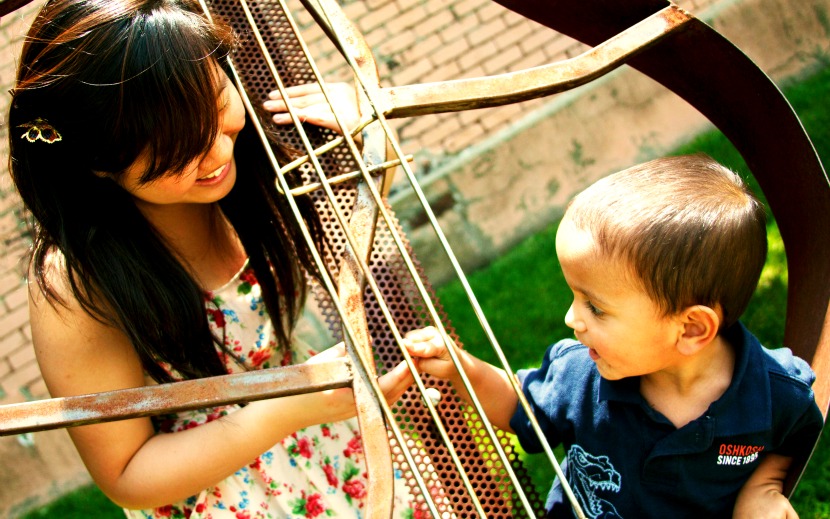Are You Their Mommy or Nanny?

In today’s changing face of America, the next generation fits much less neatly into one category and instead reflects all sorts of mashy combos. So when it comes to that perennial parlor of the petite play set — the neighborhood playground — children and their adult guardians comprise an especially compelling illustration of the shifting demographic. In reflecting upon one exchange, Mash-Up Korean-American Helen S. Kim, the mother of Korean-Italian-Irish-American twin toddlers, reminds us here why it’s important to check our assumptions at the door — er, bench. Editor’s Note: Don’t miss Part II of Helen’s essay: Mother of Two, ISO Nanny.
At the playground, a little girl shows interest in my 4-month-old twins. “Is that a girl? Is that a boy?” she asks. “How old are they? Are they twins?” I answer each question, smiling at her curiosity. And then she asks: “Are you their mom or their babysitter?”
I’m startled, but I answer, “I’m their mom.” After a moment, I ask the girl, “Are you here with your mom or your babysitter?” She tosses her long hair. “She’s my nanny, not my babysitter.” With that zinger, she’s off, cartwheeling around the slide before skipping to the other side of the playground.
For the rest of the day, I ponder the exchange. Both of my kids have brown hair and brown eyes, but my son has lighter skin and lighter hair; a number of people have said he looks like his father, who comes from Italian and Irish stock. My daughter’s skin is closer to mine in color and she has a more pronounced epicanthic fold at the corner of each eye; a number of people have said she looks like me.
The subtext: my son looks more Caucasian, my daughter more Asian. If my children both looked Asian, would that little girl have asked that question?
If my children both looked Asian, would that little girl have asked that question?
When I posted a brief summary of the encounter on Facebook, many friends, including some I hadn’t talked to in years, commented. Everyone on my feed seemed to know someone who had been asked this question. A Brazilian woman, asked in the Philippines if she were her child’s nanny. An Indian woman, asked the same question in Hong Kong. A Dominican-American friend, while out walking with her infant son in New York, accosted by a woman who offered her a job as a nanny: the woman said she’d beat any wage the child’s mother was paying.
A Caucasian friend living in Japan was asked because her daughter’s eyes are blue (like her father’s) rather than brown (like my friend’s). Any difference in physical appearance, it seems, can pique someone’s curiosity about a child’s parentage and prompt the question, is she yours? Whatever the trigger, the resulting reaction is the same: Excuse me? A high school friend, whose children are comparatively fairer-skinned, gets the question all the time. “I try to take it in stride, but it rubs me the wrong way,” she said. “Especially my youngest is offended that anyone would think I’m not his mom!”
Exactly. It rubs me the wrong way too, and I can’t put my finger on why. I suppose it feels presumptive. Reductionist. That I might not be the mother of my children simply because they don’t resemble me, or resemble me enough. And I realize, to my dismay, that I’m guilty of the same presumptive, reductionist thinking. In my Brooklyn neighborhood, if I see a woman with a child of a different race at the playground, I assume she is the nanny. Conversely, if the woman and child seem to be of the same race, I assume she is the parent. But you can’t know for certain, can you?
I realize, to my dismay, that I’m guilty of the same presumptive, reductionist thinking.
I know people who have adopted, or who’ve used sperm or egg donors. My own kids are biracial. You’d think I’d know better. How are my assumptions about the adult-child combinations in my neighborhood any different from the little girl’s question to me?
Well, maybe they aren’t. But I’m an adult and my questioner was a kid. Kids have a smaller pool of experiences to draw from. A Caucasian friend wrote that in her many years nannying, little kids regularly asked her or her Caucasian charges whether she was their mom or sitter. “We were all pasty white people,” she said. “I don’t think kids see grownups as individuals, but as one of two types. It’s their version of cocktail banter.”
This comment, more than anything, made me feel better. How do we make sense of the world? By categorizing. In the beginning, these categories are necessarily simple. Black or white. Mommy or Daddy. Boy or girl. But with time, we grow to understand that nothing is as simple as it seems. Gray (at least 50 shades!). Mommy and Mommy. Daddy and Daddy. Boy born a girl, girl born a boy. A kid asking, “Are you the mom or the babysitter?” just might not have grown out of that first paradigm. It’s the adults who need to realize that things aren’t always so clear-cut.
I’m not sure what I’ll say the next time someone asks whether I’m my children’s nanny or their mother. But I’ve decided to assume the best rather than the worst, and approach the question as if the other person knows just how un-clear-cut things can be. Because if you know any adopted kids, biracial kids, or children from first marriages, or that genes can throw a party and wind up expressing themselves with unexpectedly blue eyes or fair skin — then it might very well be reasonable to ask whether that lady pushing the swing is the mom or the nanny. Because even if you think they look alike, you can’t know for certain, can you?





